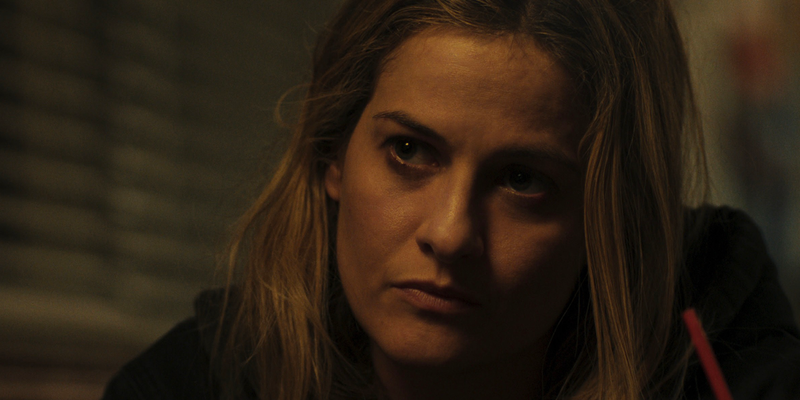
Peace in the Valley
Tribeca Festival Viewpoints Section
Reviewed for Shockya.com by Abe Friedtanzer
Director: Tyler Riggs
Writer: Tyler Riggs
Cast: Brit Shaw, Michael Abbott Jr., Dendrie Taylor, William Samiri
Screened at: Village East Cinema, NYC, 4/16/22
Opens: June 12th, 2022
It’s exceptionally tragic that a film about a mass shooting in a supermarket would premiere at a film festival just weeks after a similar real-life event, especially since there’s no way the filmmakers could have known at the time of production about its future occurrence. Yet it’s so predictable in today’s America that something like this would happen again, and Peace in the Valley doesn’t seek to exploit their devastating frequency for political purposes or to make any argument about why they happen. Instead, this film emphasizes the impact on those left behind in every case.
Ashley Rhodes (Brit Shaw) is in a supermarket with her husband John (Michael Abbott Jr.) and her young son Jesse (William Samiri) when they hear gunshots. John, a firefighter, runs towards the sound and ends up dead after saving the lives of many others. Ashley and Jesse are left to mourn John, whose sacrifice was certainly noble but who both miss him in different ways. Ashley is forced to assume the role John played to Jesse while dealing with her own resentment towards John for having abandoned her, even if he died so that others could live, while simutaneously grappling with the return of John’s twin brother Billy (Abbott Jr.).
Peace in the Valley is not a film with big stars or blockbuster production values. Instead, it’s a quiet, intimate story of how life goes on when someone is gone. It serves as a strong and effective survey of grief and the complicated ways in which it often manifests itself, including in anger towards someone for dying, regardless of the circumstances, since that means that they are no longer around and cannot be held accountable for anything that they did or the mess they may have unintentionally left behind in their absence.
Opening this film with a shooting may be triggering for some viewers, and there’s no part of it that feels manipulative. Ashley’s resistance to attending and then speaking up at grief support meetings has nothing to do with how her husband died, and no significant mention is made of the shooter’s motivations. What does complicate matters is that Jesse is eager to go hunting, something John was supposed to teach him, and something that Billy now steps in to do on his behalf. There could easily be a film all about this aspect of the story by itself, but, in this film, it’s merely wrapped up in all the conflicting emotions that Ashley feels as she has to put on a brave face for her son.
Shaw delivers a powerhouse performance that is defined not by aggression or anger but instead by a knowledge that she must persevere. There is a terror she feels in the opening scene that has less to do with the shots she hears and the worry she has for her son but instead with her husband’s decision to get her to safety and then run back towards danger. It’s an entirely noble and heroic gesture, but one that doesn’t involve a joint decision, and Shaw conveys the weight of that throughout the entire film in a quiet and resilient turn that suggests she should receive similar lead roles in the future.
There will surely be those who would hope that this film took a firmer and more definitive stance on the subject of gun violence, indicting the shooter for the irreparable harm caused to his random victims and placing blame on American society for allowing this to happen again and again with no action on gun control, especially at this specific moment. While it can certainly be used in defense of those arguments, there are also those who will instead cite mental health and patriotism as essential qualities of this story. But to assign that message to this film doesn’t serve it, and it functions well enough in its own right as a powerful character study and cinematic exploration of grief.
88 minutes
Story – B+
Acting – B+
Technical – B+
Overall – B+
